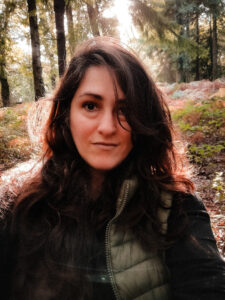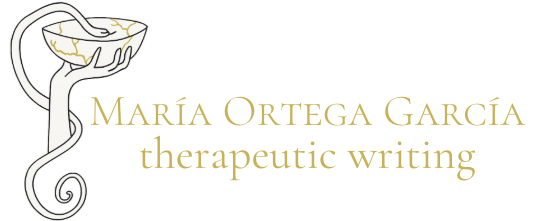Find your voice. Rewrite your story
Therapeutic writing: a safe place to unburden your story + Poetry therapy: where silence begins to speak
A safe space to unburden your heart, explore what aches, and reconnect with your voice.
Through guided writing, narrative, journaling and poetry, we slowly rewrite the story you tell yourself, discovering meaning, presence, and healing along the way.
Through a blend of educational guidance, poetry therapy, and expressive writing, my sessions support emotional healing, self-expression, and reconnection with both yourself and the language you live in.
bearing an untold story inside you? a cripling inner voice? emotional pain?
Therapeutic writing invites you to slow down and listen to your inner world.
In individual or group sessions, we explore what aches and what wants to be rewritten.
I offer therapeutic writing sessions, one-to-one or in small groups, where words become a safe place to listen, release, and rediscover yourself.
Each session blends writing, reading, and reflection in a gentle, trauma-informed space that welcomes whatever you bring.
You don’t need to be a writer or a poet, only willing to show up with honesty and curiosity.
Together, we explore your inner landscape, rewriting stories that once felt heavy and finding new language for healing and belonging.
1:1 therapeutic writing sessions
These one-to-one sessions offer a safe, trauma-informed space to meet the parts of your story that ache to be heard.
Through guided writing and reflection, we listen to what hurts beneath the surface — giving your untold story room to breathe, soften, and begin to heal. Together, we explore the roots of emotional pain and work toward easing its weight through words, presence, and compassionate attention.
group therapeutic writing workshops
These small-group sessions (up to ten participants) offer a safe, trauma-informed space to write, reflect, and share around specific themes.
Each gathering invites you to explore your experience through guided writing and poetry, listening to what resonates beneath the surface.
In this shared circle, stories echo and connect — amplifying understanding, deepening compassion, and reminding us that healing is never a solitary act.
“Words are events, they do things, change things. They transform both speaker and hearer; they feed energy back and forth and amplify it. They feed understanding or emotion back and forth and amplify it.”
Ursula K. Le Guin
hi, I'm María
a therapeutic writing facilitator & teacher
with a holistic approach & trauma-informed lenses
As a transdisciplinary therapeutic writing facilitator and teacher, I use the power of language, especially poetry and personal narrative, to support healing, expression, and transformation.
Through trauma-informed, culturally responsive practices, I create spaces where individuals and communities can reconnect with their inner voice, explore lived experiences, and reimagine their stories. Whether working with people learning a new language, working in education, or simply navigating self-doubt, low self-esteem, or uncertainty in how to express themselves, my approach integrates verbal mediation, creative facilitation, and reflective dialogue to nurture voice, visibility, and belonging.
In a world where language can wound or silence, I choose to work with it gently, purposefully—so that words can become bridges back to ourselves and to each other.
My approach
My practice weaves together trauma-informed principles, poetry therapy, journaling, and narrative therapy to create spaces where words can become tools for healing and self-discovery, individually and in community.
As an educator and language teacher, I’ve spent years exploring how language shapes the way we think, feel, and connect. My background in the humanities (with a focus on languages and literature) and a master’s in scenic arts deepened my understanding of storytelling, expression, and the transformative power of creative process.
Alongside my academic work, my lifelong passion for expressive and autobiographical writing has given me an intimate, lived understanding of what it means to write from experience: to give form to what aches and find meaning through words.
I believe in the power of language to heal and transform, and I also recognise its shadow, how words can wound, silence, or hold us in place.
My purpose is to guide my clients toward the healing, generative side of language: where words soften pain, restore connection, and open space for new stories to emerge.

In every session, whether through poetry, journaling, or shared dialogue, my role is to hold a safe space where you can listen, express, and gently rewrite the language of your own becoming.
BIO
María is a transdisciplinary poetry therapy practitioner and educator working at the intersection of mental health, language, and creative expression. With a professional background as a language teacher and coach, she brings a trauma-informed, narrative-based approach to her work, using poetry and verbal mediation to support individuals—particularly those navigating displacement, marginalization, or challenges with self-expression—in reclaiming their voice and reshaping their personal narratives.
Her practice blends education, psychosocial care, and the arts to foster healing, empowerment, and social transformation. A systems thinker with a deep curiosity about how the mind works, she is committed to both personal and societal well-being.
She lives between northern Spain and southern Ireland, and her work serves both local communities and a global audience through online spaces. Spanish is her mother tongue, English her primary language of professional expression—but neither tells the whole story. Her approach to language is fluid, relational, and rooted in the belief that authentic self-expression is a vital force for connection and change.
TRAINING
▻ Community-based mental health and psychosocial support in emergencies and displacement (30h) by IOM (2025).
▻ Diploma in trauma and mental health informed schools and communities (Level 5 diploma, practitioner status) by TISUK (2024).
▻ Intercultural Awareness, HSE, Ireland (2022).
▻ Understanding trauma and supporting the needs of people fleeing war and/or persecution, webinar delivered by Jennifer Hayes, Department of Psychology, HSE, Ireland (2022).
▻ Poetry Therapy Practitioner by iaPoetry (2023).
▻ Emotional learning based on thought training by Instituto Cervantes (2017).
▻ Transforming Business, Society and Self with u.Lab (Online, MIT X, 2016)
▻ DELE and SIELE examiner by Instituto Cervantes (2014, 2016)
▻ Diploma Teaching Spanish as a Foreign Language by Instituto Cervantes (2011)
▻ MA. in Scenery Arts by Universidad de Burgos. (2008)
▻ BA. in Humanities (Applied Languages) by Universidad de Burgos (2005).
Informal research and training in embodied/experiential learning, integrational lingüistics, identity, multiculturalism and multilingualism, creative writing.
Ready to begin?
Every journey starts with curiosity. If you feel called to write your way home, you are welcome here.
Let’s begin with a short call to sense whether this work is right for you.
Please reach out for a free consultation via email ([email protected]) or by filling out the contact form on the contact page.

Or get on my mailing list
Thank you!
You have successfully joined our subscriber list. Please, go check your email to confirm your subscription.
